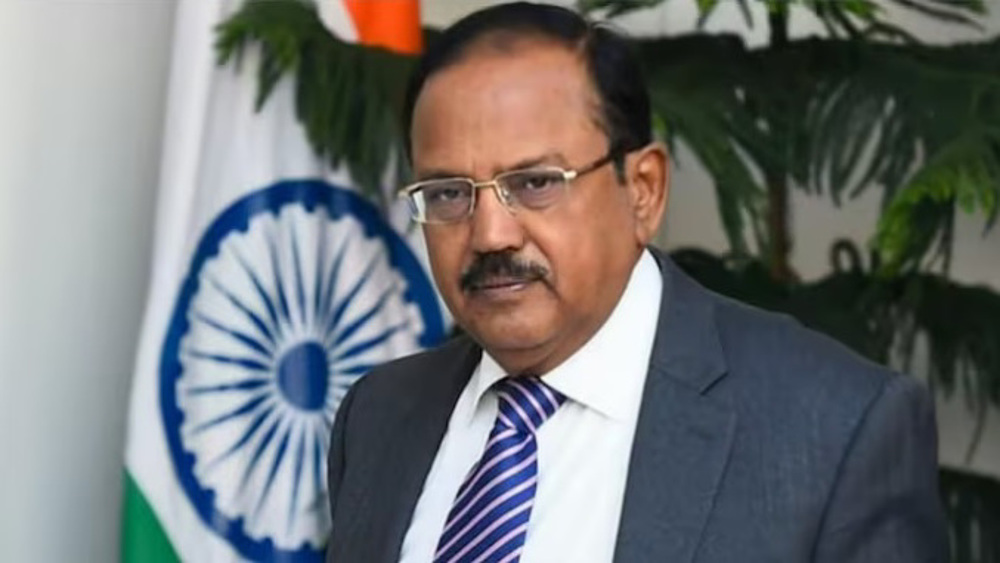Alwaght- New Delhi will use every means and opportunity at its disposal to facilitate Iran’s accession to the BRICS group, the national security advisor of India said.
Iran’s membership in BRICS, group of developing countries of Brazil, Russia, India, China, and South Africa, would expand its economic and political capacities, Ajit Kumar Doval said in a Monday meeting with Ali-Akbar Ahmadian, the secretary of Iran’s Supreme National Security Council, on the sidelines of a BRICS national security meeting.
He said India will use every means available to smooth the way for Iran’s full membership in the bloc.
The two-day 13th Meeting of BRICS National Security Advisers and High Representatives on National Security opened on Monday in Johannesburg, South Africa.
The BRICS Group includes the world’s emerging economies -- Brazil, Russia, India, China, and South Africa -- and is often viewed as an alternative to Western economic and political hegemony.
The five-nation bloc accounts for 42 percent of the global population and about 26 percent of the world’s economy, according to the South Africa-based Institute for Security Studies.
Iran is among dozens of countries that seek membership in the BRICS and has submitted a formal application to join the body.
Ahmadian, for his part, pointed to the long-established and friendly relations between Tehran and New Delhi, urging increased all-out relations between the two countries.
He also said Tehran and New Delhi hold common positions and concerns in regard to the fight against terrorism and drug trafficking, expressing Iran’s readiness to develop cooperation with India in this regard.
Chabahar port development
Elsewhere in his remarks, Doval said Chabahar Port in southeastern Iran plays a key role in boosting economic relations between the two countries.
He also called for the removal of existing obstacles on the path of the seaport’s development.
The Iranian security chief also pointed to Chabahar port as a symbol of Tehran-New Delhi cooperation and called for quicker implementation of agreements between the two countries in the fields of transportation, energy, and banking.
Chabahar port, located in Iran’s Sistan-Baluchestan province, is the country’s only oceanic port in the Gulf of Oman and holds great economic and political significance. To improve the country’s maritime trade Iran has taken serious measures for the development of the port.
In 2016, India, Iran, and Afghanistan signed a trilateral agreement to give New Delhi access to Kabul and Central Asia via the port.
Later, in a separate deal, Iran and India agreed to install and operate modern loading and unloading equipment including mobile harbor cranes in Shahid Beheshti Port in Chabahar.
However, Iranian authorities say they are not satisfied with the pace of work carried out by Indian companies at Shahid Beheshti terminal in Chabahar as well as in the infrastructure projects connecting the port to the wider transportation network in Iran.
This comes despite the fact that New Delhi has received exemptions from American sanctions on Iran to be able to develop the port.
Last month, Ali-Akbar Safaei, head of Iran’s Ports and Maritime Organization, said that in an earlier visit by an Indian delegation to Iran, the two sides have agreed to settle the differences regarding the long-term contract for the development of the Chabahar Port.
Non-Aligned Movement
Doval also highlighted the role of the Islamic Republic of Iran and India in the Non-Aligned Movement (NAM), voicing New Delhi’s readiness for closer cooperation with Tehran to play greater roles at the international forum.
Ahmadian also said that utilizing the capacities that NAM holds is among the priorities of Tehran’s foreign policy.
With its 120 member states, the NAM is the largest grouping of countries outside of the UN, making it an important role player in global and multilateral affairs.
Earlier this month, Iranian Foreign Minister Hossein Amir-Abdollahian who visited the Azerbaijani capital of Baku to take part in the Ministerial Meeting of the NAM said the movement lends a “unique scope” to expand multilateralism and tackle new global challenges.



























